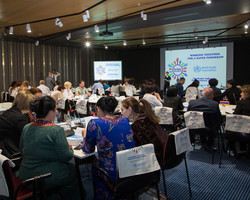Pandemic influenza preparedness: 5 priority countries on the road to sustainability

WHO
Since 2014, WHO/Europe has been supporting the 5 priority countries of Armenia, Kyrgyzstan, Tajikistan, Turkmenistan and Uzbekistan, to build and strengthen national preparedness and response for the next influenza pandemic, through the Pandemic Influenza Preparedness (PIP) Framework Partnership Contribution (PC). The 5 countries are now focusing on achieving sustainability and self-reliance as demonstrated at this year’s annual meeting held in Yerevan, Armenia from 2–4 October 2019.
Moving towards sustainability
Every year, influenza experts from each recipient country meet to galvanize efforts and review progress. Measurable progress was reported in the areas of laboratory and surveillance strengthening and influenza pandemic preparedness planning. However, and as per the theme of this year’s meeting, sustainability is now recognized as the goal for these priority countries.
Through working groups and practical discussions, participants from the priority countries focused their efforts on exploring ways to achieve sustainability and self-reliance in the following 6 areas:
- organizational capacity
- strategic planning
- partnerships
- funding
- communications
- programme evaluation.
National influenza centres (NIC)
National influenza centres are institutions responsible for the laboratory surveillance of influenza. They play a pivotal role in collecting clinical samples and isolating influenza viruses, making it possible for WHO to:
- monitor the influenza season each year
- make vaccine recommendations
- identify potential sources of pandemic influenza.
The meeting provided the opportunity to present the Virological Reference Laboratory of the Centre of Public Health and Nutrition of State, located in Ashgabat, Turkmenistan, which was recently recognized by WHO as a national influenza centre (NIC), and to report on the finalization of Turkmenistan’s revised pandemic preparedness plan. Participants were also given a tour of the Armenian NIC as well as a sentinel site that conducts surveillance for severe acute respiratory infections.
Looking forward
In 2020, Ukraine will become the 6th PIP PC recipient country. More broadly, efforts related to 2020/21 PIP activities will concentrate on updating pandemic preparedness plans, achieving WHO NIC recognition in the remaining two countries, and maintaining laboratory and surveillance capacities with a goal towards local sustainability.
About the Pandemic Influenza Preparedness (PIP) Framework
The Pandemic Influenza Preparedness Framework for the sharing of influenza viruses and access to vaccines and other benefits (PIP Framework) brings together Member States, industry, other stakeholders and WHO to implement a global approach to pandemic influenza preparedness and response. The PIP Framework is built on 3 fundamental pillars: virus sharing, benefit sharing and governance.



